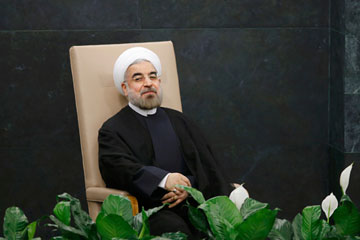
Iranian President Hassan Rouhani waits to address the U.N. General Assembly.
(4 of 4)
But skeptics expect less nitty-gritty than the familiar broad talking points. The charm offensive from Tehran has come with no specific offer to make concessions, like a potential pause or slowdown in Iran's enrichment of uranium, which the Obama team had been talking up in the past few weeks. Rouhani seemed to set that firmly aside in his U.N. address when he said it was "an illusion" to think that Iran could be pressured into limiting its enrichment program--a fundamental demand of the U.S. and its Western allies.
Which raises the very real possibility that the entire Manhattan charm offensive was a distraction, plain and simple. Israeli Prime Minister Benjamin Netanyahu has called Rouhani--who was a key member of Ayatullah Khomeini's original revolutionary inner circle--a "wolf in sheep's clothing." After Rouhani's NBC News interview on Sept. 18, a statement from the Israeli government warned that Iran's leader was dissimulating: "There is no need to be fooled by the words. The test is not in what Rouhani says, but in the deeds of the Iranian regime, which continues to advance its nuclear program with vigor while Rouhani is being interviewed." Israel's fear is that Obama will be seduced into letting Iran off too easily. "A bad deal is worse than no deal," an Israeli official tells TIME.
There is good reason for Obama to doubt Rouhani's intentions. From 2003 to 2005, the Iranian President was his country's chief nuclear negotiator with European officials. (Bush wasn't talking to Tehran then.) After he finished that job, he boasted in a 2004 speech to fellow clerics that he'd used deception to buy time for Iran's program to advance. "While we were talking with the Europeans in Tehran, we were installing equipment in parts of the facility in Isfahan," he said, referring to a key uranium-enrichment site. "There was plenty of work to be done to complete the site and finish the work there. In reality, by creating a tame situation, we could finish Isfahan."
Obama officials say the West won't be fooled again by happy talk. "The acid test remains whether the Iranian government is prepared to take actions that constrain, limit and roll back its existing nuclear program in a manner that provides confidence it is peaceful in nature," says an Obama Administration official who works on Iran issues.
This helps explain why the failed handshake at the U.N. may prove to be a turning point. Obama may be eager for a deal with Rouhani. But the Iranian leader can't ignore the fact that the nuclear program has strong support among both the country's hard-liners and the general public--even those who detest the theocratic leadership. Yet if the West concludes that Rouhani and Khamenei are trying to dupe them, the consequences could be severe. "If [Obama] engages and Iran walks away, then his mandate to strike is all the bigger in the eyes of the world," says Anthony Cordesman, a Middle East expert at the Center for Strategic and International Studies.
But Obama badly wants to escape the decision to attack Iran. The question is how far he'll reach out his hand to do so.
--With reporting by Jay Newton-Small/Washington
